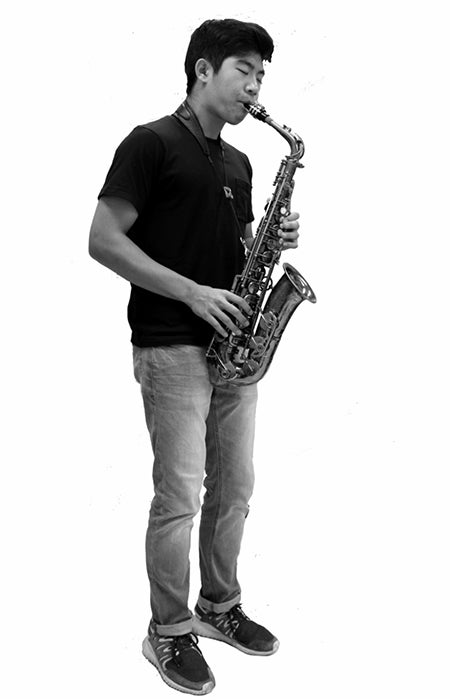
Student sets Cleopatra’s life to music
For his final project in the course “Cleopatra’s World,” USC undergraduate student Simon Hwang ditched the term paper and decided to compose two jazz pieces that explore different aspects of the storied Egyptian ruler’s life.
“Was There, Us?” focuses on Cleopatra’s two relationships with Julius Caesar and Marc Antony. “G Avenue” evokes the power that Cleopatra exercised as the leader of Egypt.
Hwang said he wanted his first piece to look at the nature of Cleopatra’s romantic relationships with Julius Caesar and Marc Antony because it is nearly impossible to gauge the role political expediency played in each of them.
“I found her relationships with Julius Caesar and Marc Antony particularly interesting because of the amount of ambiguity involved — especially how they can be perceived to be politically motivated and not based on true love. I wanted to see what emotions I could evoke from essentially glorifying Cleopatra’s relationships as perfect and romantic ones,” Hwang explained.
Was There, Us?
Associate Professor of Classics and History Christelle Fischer-Bovet, who taught the course, said that the class examines representations of Cleopatra throughout history — from ancient sources to Shakespeare to modern films and television series — to assess how women leaders were and continue to be perceived problematically in different societies.
Students in the class can work on either a final paper or a creative project; she encourages those who choose the latter to combine the course material with skills and techniques they’ve learned through their major, all the while reflecting on their approach, aims and the possible difficulties they faced. One student in a previous class, for example, created a cubist drawing of Cleopatra.
“Simon’s idea was exactly the sort of project I was hoping for,” Fischer-Bovet said. “He continues to build Cleopatra’s legacy with his two musical compositions and shares his own views on why it still matters to talk about Cleopatra.” She added that she was impressed with the two songs’ ability to expose the tension between politics and romance, as well as to convey the strong will Cleopatra exerted as a ruler determined to keep her kingdom independent.
Simon’s commitment to the project was also impressive, Fischer-Bovet added. “Simon’s music made a strong impression on the whole class. And though he had been in Korea since the lockdown started, he decided to join the meeting in the middle of his night for presenting ‘Was There, Us?’” she said. The students in the class, she added, were amazed that Simon had played all of the instruments in that song, and they were touched that he was able to express their course material so well through music.
A non-musical background
Hwang, who is scheduled to graduate in the fall of 2023 and is majoring in jazz studies at USC Thornton School of Music and business administration at USC Marshall School of Business, grew up in several cities, including Hong Kong, Seoul and Princeton, New Jersey. Although he wasn’t really interested in composing music as a young child, he did start playing the saxophone at age 10, and later, in high school, he began to compose music. It was in Princeton, he said, that he discovered a love of jazz, one that led him to USC.

Simon Hwang set Cleopatra’s life to music with two original jazz compositions. (Photo: Courtesy of Simon Hwang.)
“I fell in love with the campus when I visited. It had a vibe and aura that I didn’t feel anywhere else,” he said.
Hwang enrolled in the Cleopatra class because the ruler was “a subject full of character,” and he was particularly interested in Cleopatra’s relationships with the two powerful Romans. When given the choice to create something different for the final, he decided to see how the subject might influence his musical composition.
“I typically don’t combine fields unless there’s an objective or necessity to — like a class assignment — but when I’m playing the saxophone and improvising, I most certainly am influenced by fields other than jazz,” he explained. He added that while he doesn’t anticipate expanding the two pieces, he might pick them up again if any future compositions shared those themes.
Meanwhile, while he enjoyed the history course, Hwang added that he would next like to try his hand at another field — creative writing, also offered at USC Dornsife.
“Poetry is certainly something I’d like to get into if given the opportunity,” he said. “The creativity involved in writing poetry would be very beneficial to writing lyrics for my compositions.”